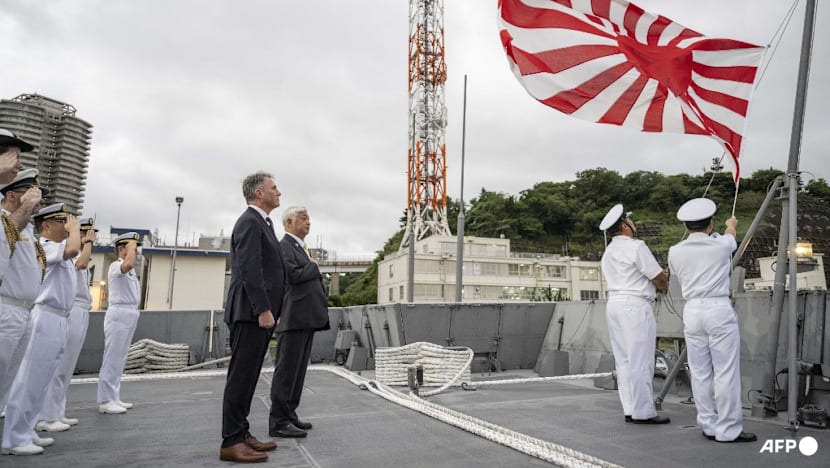Japan, Australia to deepen defence ties

Australia's Defence Minister Richard Marles (centre, left) and Japan's Defence Minister Gen Nakatani (centre, right) take part in a ceremony ahead of a joint press announcement aboard the Japan Maritime Self-Defense Force (JMSDF) Mogami-class stealth frigate JS Mikuma at the JMSDF naval base in Yokosuka, Kanagawa Prefecture on Sep 5, 2025. (Photo: AFP/Pool/Yuichi Yamazaki)
TOKYO: Japanese and Australian ministers met Friday (Sep 5) in Tokyo and agreed to deepen defence ties, days after Beijing hosted a massive military parade.
Japan is strengthening cooperation with US allies in the Asia-Pacific region that, like Tokyo, are involved in territorial disputes with China.
The bilateral meeting of foreign and defence ministers follows the Beijing military parade which was attended by leaders including Russian President Vladimir Putin and North Korea's Kim Jong Un.
Analysts say the line-up was Chinese President Xi Jinping's vision of a new world order, sidelining the United States.
"Reaffirming the importance of working together to prevent unilateral changes to the status quo by force, we agreed to strengthen cooperation," Japanese defence minister Gen Nakatani said after the Tokyo talks.
"Additionally, we reconfirmed the strengthening of cooperation with the Philippines, India, South Korea, ASEAN, Pacific countries, and others," Nakatani told journalists.
Public broadcaster NHK said the two countries agreed to conduct advanced training between their militaries, and enhance collaboration in economic security areas such as critical minerals and energy.
Friday's meeting comes after Canberra announced a US$6 billion deal in August to buy 11 advanced warships built by Japan's Mitsubishi Heavy Industries, in what has been billed as one of Japan's biggest defence export deals since WWII.
Australia is in the midst of a major military restructure, bolstering its navy with long-range firepower in an effort to deter China.
Beijing and Tokyo are embroiled in a row over Japan-controlled islets in the East China Sea, and Japanese officials regularly protest the presence of the Chinese coast guard and other vessels in the waters surrounding the remote islands.
China claims nearly all of the South China Sea, locking it into disputes with several Southeast Asian neighbours.
"We've also expressed concerns over destabilising activities in the East and South China seas and reaffirmed our long-standing position to oppose any unilateral changes to the status quo," Australia's Foreign Minister Penny Wong similarly told reporters.
"We need to work together to build resilience and respond to emerging threats," Wong said.















